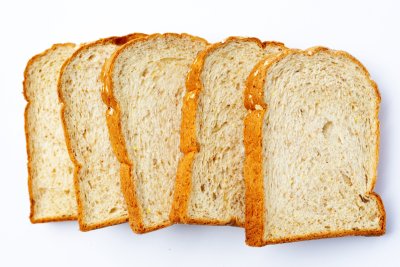Supermarkets defend use of white flour in wholemeal loaves
They tell the Real Bread Campaign white flour is being used but not as an ingredient.

In July 2023, the Real Bread Campaign found what appeared to be refined (ie non-wholemeal) flour being used as an ingredient by Aldi, Asda, The Co-operative, Sainsbury’s, Marks & Spencer and Waitrose in one or more products each names and markets using the word wholemeal.
Section 6 of The Bread and Flour Regulations (1998) requires that: 'There shall not be used in the labelling or advertising of bread, as part of the name of the bread, whether or not qualified by other words […] the word 'wholemeal' unless all the flour used as an ingredient in the preparation of the bread is wholemeal.’
23 October 2023: We published a statement sent by Defra to trading standards officers, which confirms the practice of using the word wholemeal in the name or marketing of a product made using white flour breaches the Bread and Flour Regulations.
Correspondence
Between 3 and 7 July 2023, the Campaign emailed the CEO, or an executive director, of each company.
Jump to subsequent correspondence between the Campaign and: Aldi, Asda, The Co-operative, Marks & Spencer, Sainsbury's, Waitrose, and local authority departments/officers responsible for the Primary Authority relationship with each company with regard to trading standards.
See also
Aldi
2 October 2023: We asked the company’s Primary Authority (Peterborough City Council) for an update on their investigation into our complaint.
22 August 2023: Having still had no further response from the CEO's office, we sent our complaint to Peterborough City Council, which is the company's Primary Authority for trading standards.
18 August 2023: We again asked the CEO's office for a reply to our email of 10 July.
19 July 2023: We followed up with the CEO's office, asking for either an answer or an ETA for it.
10 July 2023: the Campaign’s replied:
'Thank you for confirming that non-wholemeal wheat flour is being used in one or more Aldi own-brand products that are named and advertised using the word wholemeal.
Whatever the intended purpose of using this refined flour is, it is an ingredient that remains in the finished product, that has the same technological effect as refined flour added for any other intended purpose.
The Real Bread Campaign continues to challenge the concept of ‘processing aids’. We believe it to be a legal loophole that enables the use of additives by stealth, allowing manufacturers and retailers to choose not to declare the use of a substance. Companies choosing to omit ‘clean label’ additives from ingredients lists denies their customers their right to know what has been used to make a product, for whatever reason(s) they might need or want this information. We continue to lobby Defra to make mandatory the listing of all substances used for all baked products, including in point of sale labelling for products sold loose/unwrapped. In the meantime, urge retailers to enable their customers to make better-informed buying choices by providing this information voluntarily.
The issue here, however, is that wheat flour is not a so-called processing aid or any other type of additive, it is an ingredient.
According to The Food Labelling Regulations 1996, a processing aid: ‘…means any substance not consumed as a food by itself, intentionally used in the processing of raw materials, foods or their ingredients, to fulfil a certain technological purpose during treatment or processing, and which may result in the unintentional but technically unavoidable presence of residues of the substance or its derivatives in the final product, provided that these residues do not present any health risk and do not have any technological effect on the finished product.’
Your argument that the ‘fortified’, refined wheat flour can be classed as a processing aid fails on the grounds that, like the rest of the wheat flour in the product, it is a substance consumed as a food by itself; and that it has the same technological effect on the finished product as wheat flour used for any other intended purpose. It also poses the same health risks as any other wheat flour to people with an allergy or intolerance to it or who live with coeliac disease – though this is a moot point in this product’s case as they would not be eating it.
Article 6 the Regulations does not include an exemption to the ‘all flour must be wholemeal’ rule on the basis of quantity used. Even if it did, the fortified flour used in this product is the third ingredient on the list. It is a major ingredient of this product, used in greater quantity than even yeast and salt.
The use of refined flour as an ingredient in products marketed as wholemeal bread is not legal and, by definition, is entirely unnecessary. This second point is proven on a daily basis by hundreds of Real Bread bakeries around the UK, which make true wholemeal bread with just wholemeal flour, water, salt and either a live sourdough starter culture or baker’s yeast.
Even some industrial loaf manufacturers, which use other unnecessary additives and extra ingredients, demonstrate they can make wholemeal products without white flour. Will Aldi join them by either removing refined flour from all products it names and markets using the word wholemeal, or by removing the word?'
7 July 2023: Aldi wrote:
‘I am writing regarding your correspondence addressed to our CEO, Giles Hurley who has reviewed your email and asked me to respond on his behalf. Thank you for your query and the information regarding our Everyday Essentials Wholemeal Bread.
Regarding this product and your challenge specifically, we can confirm that the wheat flour in the ingredient declaration is a processing aid and as such, this wouldn’t usually be declared, however due to the allergen it is declared on pack. Our labelling approach for this product is consistent with many other leading brands and retailers who sell a similar product.
The fortified wheat flour within the ingredient declaration is wholly from processing aids within the recipe. These processing aids use fortified wheat flour as a carrier for enzymes, emulsifiers, preservative and Flour Treatment Agent (FTA). The fortified wheat flour is declared because it is following the Allergen labelling legislation whereby all allergens, including processing aids, are to be declared. Fortified wheat flour is a different allergen to wholemeal wheat flour and therefore declared separately.
We take on board the Bread and Flour Regulations 1998 but believe we conform to these – the wholemeal bread is made purely from wholemeal flour but does use processing aids containing fortified wheat flour as detailed above.’
Asda
2 October 2023: We asked the company’s Primary Authority (West Yorkshire Joint Services) for an update on their investigation into our complaint.
25 August 2023: WYJS replied: "At this moment in time there is no update, we are working with Asda and will provide you with an update in due course."
18 August 2023: We asked WYJS for an update on the progress of this case and give me an estimated timescale for resolution
21 July 2023: A trading standards officer at WYJS responded: 'I acknowledge receipt of your email; I will look into this and will be touch in due course.'
13 July 2023: The Campaign emailed the West Yorkshire Joint Services (WYJS) email address supplied by Asda.
12 July 2023: Asda advised advise 'the appropriate e-mail address for the appropriate person at West Yorkshire Trading Standards.' [sic.]
12 July 2023: The Campaign replied to Asda.
'Thank you for brightening up my morning. The grounds on which you base your claim that Asda wholemeal loaves are exempt from Article 6 of the Bread and Flour Regulations made me laugh out loud.
Where and when the white flour is added to these loaves makes no difference to the fact that it is present – in significant quantity - in the products that Asda customers eat. Is your next gambit going to be suggesting that Asda customers not wanting white flour in their supposedly wholemeal loaves are free to brush it off?
I see no validity in your claim that the products are exempt on the grounds that they are marketed using the phrases “Sliced wholemeal bread with a wheat flour dressing” and “Dusted with a Sprinkle of Wheat Flour”. For one thing, those descriptions do nothing to inform a shopper that the flour is white, rather than wholemeal. More importantly, the Regulations offer no derogation to the ‘all flour must be wholemeal’ rule based on refined flour being mentioned. In fact, Article 6 specifically prohibits the use of the word wholemeal in the name or advertising of a product “whether or not qualified by other words” if the ingredients include non-wholemeal flour.
Ultimately, there is no function served by refined flour that couldn’t be served by wholemeal flour and yet Asda chooses to use the former.
I have searched the BEIS Primary Authority Register to find the local authority with which Asda has that relationship for trading standards but found more than one listed. Please advise the correct local authority for me to send our complaint.
Fear not, I won’t publish your name.'
12 July 2023: Asda responded to the Campaign.
'We at Asda agree entirely that the legal points cited by you are perfectly correct, wholemeal bread must be made exclusively from wholemeal flour. The products, which you have invited us to review, comply with this, as the product is taken out of the baker’s tin. Subsequently, and as per common practice, a dusting of wheat flour is added, however, the product sold is wholemeal bread with a wheat flour dusting and hence we are not selling a single Wholemeal product, we are selling the composite product of wholemeal bread (composite one) plus a wheat flour dusting (composite two). This fact is very clearly indicated in the legal name of the food.
I understand that you are likely to publish any response on this issue, so to that end I would appreciate it if you could continue to attribute any contents to an Asda spokesperson, or ‘letter from Asda’ as has been the case thus far.
I do hope that this provides the clarity you are seeking regarding these products.'
10 July 2023: the Campaign replied to Asda.
Thank you for confirming that non-wholemeal wheat flour is being used in Asda own-brand products that are named and advertised using the word wholemeal.
Whatever the intended purpose of using this refined flour is, it is an ingredient that remains in the finished product, that has the same technological effect as refined flour added for any other intended purpose.
There are many things in the world that have been ‘customary for generations’. This doesn’t necessarily prove them all to be legal or morally acceptable. More to the point here, Article 6 of the Regulations does not provide exemption on the grounds of habitual practice. It does not say ‘adding a small amount of white flour at the end is okay if that’s what you say people have done for years’.
Article 6 the Regulations does not include an exemption to the ‘all flour must be wholemeal’ rule on the basis of quantity used, either. Even if it did, the fortified flour used in these products appears at the upper end of the ingredient lists. It is a major ingredient, used in great quantity even than salt. Are you suggesting that the nine or ten things further down the lists shouldn’t be considered as ingredients and additives, either?
Thank you for highlighting Asda’s use of soya flour and ‘fermented wheat flour’. I don’t understand your comment: ‘It is accepted that fermented wheat flour can be added, as not in the same format.’ Accepted by which authority, and what does ‘not in the same format’ mean? Is this ingredient either wholemeal flour, but not named as such; refined flour with the legally-required so-called fortificants not listed; or refined flour without the mandatory ‘fortificants’ added?
The use of refined flour as an ingredient in products marketed as wholemeal bread is not legal and, by definition, is entirely unnecessary. This second point is proven on a daily basis by hundreds of Real Bread bakeries around the UK, which make true wholemeal bread with just wholemeal flour, water, salt and either a live sourdough starter culture or baker’s yeast.
Even some industrial loaf manufacturers, which use other unnecessary additives and extra ingredients, demonstrate they can make wholemeal products without white flour. Will Asda join them by either removing refined flour from all products it names and markets using the word wholemeal, or by removing the word?
7 July 2023: Asda wrote:
‘Thank you for contacting Asda on this subject. We agree that Regulation 6 of the Bread and Flour Regulations 1998 requires that nothing other than wholemeal flour is used as ‘an ingredient in the preparation of the bread’ and that the fortified flour types listed here are not wholemeal. However we write to explain how Asda is complying with the regulations with the following explanation which we hope reassures any concerns you may have regarding Asda branded products.
Concerning the referenced products – ‘The Bakery at Asda Farmhouse Wholemeal’, the bread is made with wholemeal flour only and baked in line with the regulations. Post bake, a very small amount of wheat flour is sprinkled over the bread which has been customary for generations. [reference to a photo in the email message]. Our ingredients lists are a single continuous list, as is perfectly lawful and quite common, hence, those lists don’t immediately indicate where the wheat flour is, however, both products make reference to the flour sprinkling in the legal name of the food and hence the customer is absolutely clear what that flour is used for – again, please see [reference to a photo in the email message].
Product One – Sliced wholemeal bread with a wheat flour dressing.
[Photo of ingredients list panel]
Comments:
1. White flour = (Dusting)
2. Malted Barley – from the wholegrain.
3. Dusting flour would also not be included in the wholemeal definition. Soya flour, Soya – is a legume and not a cereal so falls outside the definition of cereal flour.
Product Two – Sliced wholemeal bread with rye flour, sunflower seeds and a wheat flour dressing.
[Photo of ingredients list panel]
Comments:
1. White flour = (Dusting)
2. Fermented wheat flour = (It is accepted that fermented wheat flour can be added, as not in the same format).
Thank you for contacting Asda, if you have any further questions please do contact us.’
The Co-operative
17 October 2023: Manchester replied: "We are still in discussion with M&S on this matter. We will provide you with an update in due course."
2 October 2023: We asked the company’s Primary Authority (Manchester City Council) for an update on their investigation into our complaint.
31 August 2023: An officer at Manchester City Council advised: "I have reached out to the Co-Operative for their views on the concerns raised by the Real Bread Campaign. As this is a matter affecting most retailers and is not therefore specific to the Co-Operative, I am also seeking to take the views of other Primary Authorities so that a consistent approach is taken by all who may be affected. I will be in contact with your in due course with an update."
22 August 2023: Having still had no further response from the CEO's office, we sent our complaint to Manchester City Council, which is the company's Primary Authority for trading standards.
18 August 2023: We again asked the CEO's office for confirmation of their Primary Authority.
14 August 2023: We again asked the CEO's office for confirmation of their Primary Authority.
26 July 2023: We responded: "Where, when and why The Co-operative uses white flour in the manufacture of these rolls makes no difference to the fact that this ingredient is present in the product that The Co-operative's customers eat. Will your next suggestion be that your customers who buy these supposedly wholemeal loaves but do not want to eat the white flour are free to try to brush it off?
I see no validity in your claim that the products are exempt on the grounds that they are marketed using the phrase 'Soft wholemeal bread rolls dusted with wheat flour'. For one thing, that description does nothing to inform a shopper that the wheat flour is white, rather than wholemeal. More importantly, the Regulations offer no derogation to the ‘all flour must be wholemeal’ rule based on refined flour being mentioned. In fact, Article 6 specifically prohibits the use of the word wholemeal in the name or advertising of a product ‘whether or not qualified by other words’ (my italics) if the ingredients include non-wholemeal flour.
Ultimately, there is no function served by white/refined flour that couldn’t be served by wholemeal flour and yet The Co-operative chooses to use the former.
I have searched the BEIS Primary Authority Register to find the local authority with which The Co-operative has that relationship for trading standards. It says Manchester City Council - is that correct?"
26 July 2023: The CEO's office replied: "We have made some further enquires with our Food Policy team and we can confirm the legislation cited does clearly state that the term 'wholemeal' is not used unless all the flour used as an ingredient in the preparation of the bread is wholemeal. Having a responsible honest labelling policy, we validate the claim through factual evidence using the recipe itself, the production method and product description.
Furthermore, these wholemeal rolls are prepared and baked using wholemeal wheat flour only - the non-wholemeal flour (fortified wheat flour) is added as a dusting after the rolls have been baked, and and therefore we would consider this is not, by definition "used as an ingredient in the preparation of the bread".
Additionally, this is made clear on our packaging on both back and front label descriptions. "Soft wholemeal bread rolls dusted with wheat flour". This process is also commonplace across the market, and as such we do not believe there is a need to revise our recipe.
I do hope that the above information gives your some reassurance on the integrity of our Co-op products."
13 July 2023: As a week had passed without acknowledgement of the emai we sent to the CEO, we sent a follow up email. We received a reply later the same day: 'Thanks for your email to Shirine Khoury-Haq, Co-op Chief Executive. Your email has been passed onto the Executive Resolution Team to reply on her behalf. We’ve started to investigate and we’ll be in touch again shortly. '
Marks & Spencer
2 October 2023: We asked the company’s Primary Authority (Birmingham City Council) for an update on their investigation into our complaint.
29 August 2023: Birmingham replied: "I will discuss this matter with Marks & Spencer and will contact you when further information becomes available."
25 August 2023: The CEO's office wrote: "Thank you for your email, as set out in my previous response, we are comfortable that our wholemeal loaves are manufactured in accordance with the market and meet the requirements of Food Information to Consumers Regulation. We are in touch directly with Trading Standards."
We again tweeted and emailed Birmingham asking to reply to our complaint or or advise a method of contact to which they will reply.
23 August 2023: Having still had no further response from the CEO's office, we sent our complaint to Birmingham City Council, which is the company's Primary Authority for trading standards.
The email address, published in the Birmingham trading standards' Twitter account. generated an auto-response that they would not reply to emails sent to it. We tweeted asking how to contact them.
18 August 2023: We asked the CEO's office for answers to the questions in our email of 17 July.
17 July 2023: We replied to M&S: 'Thank you for confirming that these M&S own-brand 'wholemeal' products contain non-wholemeal flour.
Whatever the intended purpose of this refined flour is, it has the same technological effect as refined flour added for any other purpose. It is an ingredient that remains in the finished product that M&S customers eat.
Article 6 the Regulations does not include an exemption to the ‘all flour must be wholemeal’ rule on the basis of quantity used. Even if it did, in one case M&S lists this ingredient as being used in great quantity even than salt.
One further question: is the ‘fermented wheat flour’ listed as an ingredient in all of these products either wholemeal flour, but not named as such on the label; refined flour without the mandatory ‘fortificants’ added as required; or refined flour with the so-called fortificants added but not listed as required?
Ultimately, there is no function served by refined flour that couldn’t be served by wholemeal flour and yet M&S chooses to use the former. Will M&S either reformulate to remove all refined flour from all products it names and/or markets using the word wholemeal so that they are indeed 100% wholemeal, or rename these products?'
14 July 2023: The company's head of technology for bakery replied on behalf of the CEO: 'We always appreciate challenge and feedback on our product labelling, however I wanted to reassure you that the wholemeal loaves you have highlighted are truly wholemeal products and legally compliant in accordance with both the Bread and Flour Regulations 1998 No 141 and the Food Information to Consumers Regulation.
The additional 'wheat flour' that is being declared in this product is being used as a ‘carrier’ for approved additives i.e. ascorbic acid and emulsifiers that are added to the breads. It is also added at very low levels and as such is not being used as a 'flour ingredient' in terms of the Bread and Flour Regulations.
Within The Food Information to Consumers Regulation 2014 SI No 1855 (Article 20) the ‘carriers’ or processing aids under normal circumstances would not be declared. They are declared here as under Regulation (Article 21), if a processing aid originates from a single substance or product listed in Annex II (substances or products causing allergies or intolerances) then this must be clearly labelled. In the products highlighted the wheatflour is declared because it is an obvious allergen.'
12 July 2023: As a week had passed without acknowledgement of the emai we sent to the CEO, we sent a follow up email.
Sainsbury’s
30 October 2023: Both in One (now called Both in One Bread) has been relabelled. Rather than ‘a blend of white and wholemeal flour’, the front of pack now says ‘a blend of white and whole flour’, though the website has not yet been updated.
23 July 2023: In corresondence about the company's Stamford St. tortillas, Oxfordshire County Council advised: "the [Sainsbury's Both in One] product will also be subject to a relabelling exercise."
13 July 2023: The company responded by advising that they had referred the matter to ‘our Trading Standards officer’. We then raised our concerns with the trading standards officer at Oxfordshire County Council responseible for the Primary Authority relationship with the company.
11 July 2023: As more than a week had passed without acknowledgement of the emai we sent to the CEO, we sent a follow up email.
Waitrose
10 October 2023: Buckinghamshire & Surrey Trading Standards replied: "The position at the moment is that before we decide what advice is appropriate or possible action that may be taken we need to review the different interpretations of the legislation. Once we have done that we will progress the issue as we decide appropriately, informed by a full view of the issues, with the businesses we have had contact with. We will also be liaising with colleagues in other authorities to ensure our position is not out of alignment with theirs."
5 October 2023: We replied to Bucks and Surrey.
4 October 2023: Bucks and Surrey responded: "We are currently reviewing independent legal advice that has been taken by the Primary Authority business regarding the issue
As it is a sector wide matter we also understand that a position paper is currently being drawn up by industry/trade associations for our information and consideration
We are also mindful the government response to the BFR consultation is overdue and anticipate they will cover discussion of statute changes and disposal routes when that is published.
Therefore we consider it prudent for us to have all this information available before considering any next steps. We will of course update you on further developments"
2 October 2023: We asked the company’s Primary Authority (Buckinghamshire & Surrey Trading Standards) for an update on their investigation into our complaint.
24 August 2023: PA advised: "We will assess the information provided and investigate as appropriate."
23 August 2023: The CEO's office again declined to answer our questions. We sent our complaint to the Surrey & Buckinghamshire partnership, which is the company's Primary Authority for trading standards.
22 August 2023: An executive office case manager replied: "I'm sorry you weren't happy with the team's final response to your enquiry - I will of course make them aware of your feedback."
We replied by again pointing out that what the case manager had sent wasn’t a response to our query, it was a response to a totally different one.
22 August 2023: An executive office case manager replied: "We offer customers a wide range of choice on the type of bread they buy, including ones made with flour, water, salt and yeast, or a sourdough starter. We know for some customers, they value the freshest taste of bread, and bread made in this way does not have the same shelf life as loaves with additional ingredients. We believe it is important to offer our customers choice, with options that prioritise the traditional bread-making process and the freshest type of loaf, compared to those that have a longer shelf life."
We thanked them for the response but pointed out that we hadn't asked about freshness claims, sourdough fermentation or the use of additives and were waiting for answers about the company’s use of non-wholemeal flour in products named or advertised using the word wholemeal.
19 August 2023: The CEOs office replied: "I've chased the buyer and will let you know as soon as we have a response for you."
18 August 2023: We asked the CEO's office for answers to the questions in our email of 10 July.
10 July 2023: the Campaign replied to Waitrose -
'Thank you for confirming that non-wholemeal wheat flour is being used in Waitrose own-brand products that are named and advertised using the word wholemeal.
Whatever the intended purpose of using this refined flour is, it is an ingredient that remains in the finished product, which has the same technological effect as refined flour added for any other intended purpose.
Article 6 the Regulations does not include an exemption to the ‘all flour must be wholemeal’ rule on the basis of quantity used. Even if it did, in most of these products, the fortified flour used appears at the upper end of the ingredient lists, used in great quantity even than salt. In the case of 'Essential Waitrose Wholemeal', refined flour is the third main ingredient, used in greater quantity than both yeast and salt.
One further question, about the ‘fermented wheat flour’ listed. Is this ingredient either wholemeal flour, but not named as such; refined flour with the legally-required so-called fortificants not listed; or refined flour without the mandatory ‘fortificants’ added?
The use of refined flour as an ingredient in products marketed as wholemeal bread is not legal and, by definition, is entirely unnecessary. This second point is proven on a daily basis by hundreds of Real Bread bakeries around the UK, which make true wholemeal bread with just wholemeal flour, water, salt and either a live sourdough starter culture or baker’s yeast.
Even some industrial loaf manufacturers, which use other unnecessary additives and extra ingredients, demonstrate the possibility of making wholemeal products without any white flour. Will Waitrose join them by either removing refined flour from the products in question, or by removing the word wholemeal from the names and marketing of them?'
9 July 2023, Waitrose wrote:
‘Our technical team have confirmed the following: The only flour used in wholemeal loaves as a stand alone ingredient is wholemeal flour. The fortified wheat flour also listed in the ingredients is not wholemeal flour but is a carrier of the key ingredients added to a loaf of bread in small quantities to ensure customers get the quality and shelf life they expect.’
Published Monday 10 July 2023
Real Bread Campaign: The Real Bread Campaign finds and shares ways to make bread better for us, better for our communities and better for the planet. Whether your interest is local food, community-focussed small enterprises, honest labelling, therapeutic baking, or simply tasty toast, everyone is invited to become a Campaign supporter.





